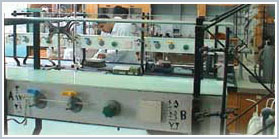The Department of Pathobiology was founded in 1953 as the Department of Hygiene and until 1998 it consisted of six divisions including Bacteriology, Virology, Immunology, Mycology, Entomology and Parasitology. Later on, it was divided into two separate departments namely, the Department of Pathobiology (Bacteriology and Virology), and the Department of Immunology and Parasitology.
In addition to the teaching of different areas of bacteriology and virology to students of Medicine, Dentistry, Pharmacy and Laboratory Sciences, Nutrition and other Paramedical sciences, the Department of Bacteriology and Virology investigates and analyses various causative agents of infectious diseases. It cooperates closely with clinical departments and with the Tuberculosis and Pulmonary Diseases Research Centre and Drug Applied Research Center at the university. The department offers a research programme, which involves the submission of a thesis by the M.S students. Since 1999, three batches of students have been admitted for the M.S course in Medical Microbiology and the students of the first two groups have now completed the course.

Divisions of the department:
Bacteriology, Virology
LEVEL OF CourseS held:
M.S in Medical Microbiology
Subject taught to students on following courses:
Medicine, Dentistry, Pharmacy, Speciality in Infectious Diseases, Speciality in Dentistry, Laboratory Sciences, Nursing, Midwifery, Hygiene & Nutrition and Paramedical Sciences.
Facilities
Educational Laboratory: Practical Bacteriology and Virology lab.
Research Laboratory: Bacteriology Research lab. & Virology Research lab.
areas of Research
* Bacteriology (Medical Bacteriology and Molecular Bacteriology)
* Virology
Research is being carried out in this department in the field of bacteriology and virology utilising conventional methods as well as newly developed techniques. Basic practical and epidemiological problems are investigated as part of the research programmes.
The department investigates all kinds of aerobic and anaerobic bacteria, causative agents of infectious diseases of the genitourinary tract, the respiratory system, the nervous system, the alimentary tract and other organ lesions.
Different tests in virology, such as haemagglutination, haemagglutination inhibition, immunofluorscent and latex agglutination techniques, complement fixation (CF), cell culture, and virus isolation are also carried out in the department.
Research is also carried out in basic subject fields and as the department maintains close relationships with clinical units of related hospitals, thus it also includes clinical investigations, including:
* Aerobic and anaerobic bacteria in otitis media
* Plasmid profile of E. coli strains isolated from in-patients and out-patients with UTI
* Nosocomial and unconventional bacteria in hospital infections
* Acute bacterial diarrhoea
* Microbial inflammation and colon cancers
* Separation of aerobic thermostable bacteria from the hot Springs
* Variations of serum proteins in patients suffering from pulmonary tuberculosis, using the electrophoresis method
* Cloning of DNA polymerase gene of thermostable bacteria in E. coli
* Study of pathogenic bacteria in sepsis
* Mannose-sensitive and mannose-resistant pili in Escherichia coli causing urinary tract infections
* Study of antibiotic resistance factors in bacteria
* Study of Streptococcus Viridans in endocarditis
* Chlamydiae in genitourinary infections
* Mycoplasma and Ureaplasma in genitourinary tract infections
* Mycobacterium tuberculosis in respiratory infections using PCR
* Helicobacter pylori infections in stomach disorders
* Flowcytometric study of cells in lower and upper UTI
* Study of enteric Adeno and Rota viruses in gasterointestinal infections
* Study of Respiratory Syncytial Virus infection in lower respiratory tract infections
* Herpes simplex type I oral infection.
Address:
Medicine School, Golghasht St., Daneshghah St., Tabriz
Tel : + 98 411 3364661
Fax : + 98 411 3364661